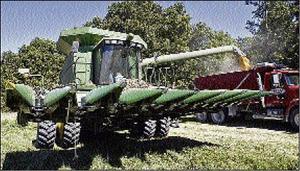
A corn-harvesting combine empties the freshly harvested grain into a truck, September 12. The growing ethanol industry, and related rises in corn prices, is staking corn growers and farmers that use corn for feed against each other. - file
Government support to farmers in the Organisation for Economic Cooperation and Development (OECD) fell in 2006, both in cash terms and as a share of farm receipts.
But the drop was due mainly to rising world food prices rather than changes in policies, as less support was provided to prop up domestic prices, the OECD, which groups developed countries, said in a report.
In recent years, the type of support has shifted away from measures linked to specific commodities.
But production-linked measures still dominate producer support in most countries.
"Further reform is needed - both to improve the domestic performance of farm policies and to contribute to more open marketsor trade in agriculture and food products," said the OECD's director for trade and agriculture, Stefan Tangermann.
Tangermann said two thirds of farm support was still stimulating production rather than furthering broader social or environmental goals such as encouraging farmers to plant hedges.
BIG DIFFERENCES
The OECD average figures mask a wide range among individual rich countries, with subsidies negligible in New Zealand but accounting for two thirds of farmers' incomes in Iceland and over 60 per cent in South Korea, Norway and Switzerland.
Among big producers, support in 2006 was 11 per cent of receipts in the United States and 32 per cent in the European Union. It accounted for 53 per cent in Japan.
A reduction in market-distorting farm subsidies by rich countries is one of the main demands from developing nations in the Doha round of trade negotiations at the World Trade Organisation (WTO).
Crop and livestock prices in OECD countries were on average 21 per cent higher than world market prices, down from 51 per cent in 1984-86, the OECD said.
This market price support is equivalent in effect to a tariff of that level and amounted in 2006 to US$149 billion.
Again, there is wide variation among commodity types, with rice in the OECD area priced at 230 per cent above world prices in 2004-06, sugar at 97 per cent and milk at 39 per cent, while wheat was only 7.0 per cent above and soy only 4 .0 per cent.
27 per cent decrease
The OECD said government subsidies as a share of farm receipts fell to 27 per cent in 2006 from 29 per cent in 2005.
In 1986-88 they averaged 38 per cent. In cash terms, they fell to US$268 billion in 2006 from US$281 billion the year before.
The report does not include subsidies for biofuels, which are now distorting markets for crops, as they, not typically paid to farmers. Tangermann said that Brazil was the only country able to produce biofuels commercially without state support.
The figures collated by the OECD differ from those monitored by the WTO to check compliance with members' obligations. Thus, support programmes such as U.S. food stamps are not counted by the OECD as they are payments to consumers, not farmers.
On the other hand, where countries abolish support prices and shelter products behind tariff walls, that form of support is not counted by the WTO, but is still counted as market price support by the OECD.
- Reuters
Taken from The Sunday Gleaner, October 28, 2007

